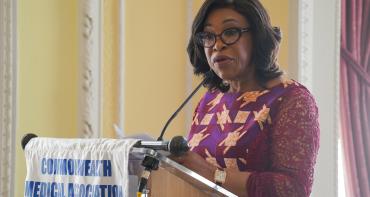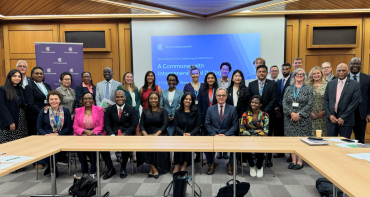Blog by Janneth Mghamba, Health Adviser and Emily Gilmour, Health Officer

As we observe World Malaria Day today, while we celebrate the global achievements over the last year, we must also acknowledge there is a long way to go in our global fight to end malaria.
In the global fight against malaria, the Commonwealth has historically made ambitious commitments to champion and progress our collective agenda to end malaria.
During the Commonwealth Heads of Government Meeting (CHOGM) in 2018, Commonwealth Leaders made a commitment to halve malaria by 2023. Then, at the 2022 CHOGM in Kigali, the commitment evolved, taking into consideration the significant impact of the COVID-19 pandemic on the global malaria fight and the need for renewed energy and investments from leaders.
The mandate became a commitment to work towards ending the epidemic of malaria across the Commonwealth by 2030, in line with national, regional and global targets. This commitment marks a significant step towards achieving the global target of reducing malaria incidence and mortality rates by at least 90% by 2030.
Malaria is still a significant threat
The Commonwealth has continued to monitor its progress towards malaria elimination, with biennial Commonwealth Malaria Reports developed and published with data from the World Health Organization (WHO).
These reports have shown that despite significant innovations and commitments in recent years, progress on reducing global malaria incidence and mortality rates has stalled.
The WHO's 2023 World Malaria Report shows that there are an estimated 249 million malaria cases in 85 endemic countries and areas, an increase of 5 million cases compared with 2021. Incidence rates have remained stable over the last three years, with 58 per 1000 population at risk in 2022, compared to 57 per 1000 in 2019.
Twenty-nine countries accounted for 95 per cent of malaria cases globally in 2022, with three out of the four of the countries with the highest burden – Nigeria (27 per cent), Uganda (12 percent) and Mozambique (4 per cent) – being part of the Commonwealth. Among countries with the highest deaths included Nigeria (31 per cent), the Democratic Republic of the Congo (12 per cent), Niger (6 per cent), and the United Republic of Tanzania (4 per cent).
These findings tell us whilst the road remains long towards our goal of ending the epidemic of malaria by 2030. However, each mile continues to bring us closer.
Vaccines can accelerate elimination
In October 2023, the WHO recommended a second vaccine to prevent malaria in children living in areas of risk – R21/Matrix-M (R21) – which will complement the ongoing rollout of the first malaria vaccine, RTS,S. Both vaccines are shown to be safe and effective in preventing malaria in children and, when implemented broadly, are expected to have a significant public health impact. To date, the RTS,S vaccine has been administered to over 2 million children in Ghana, Kenya and Malawi.
It has shown to be safe and effective, resulting in a drop of 13 per cent in all-cause early childhood deaths and a substantial reduction in severe malaria.
In January this year, Cameroon made history by incorporating the RTS,S into its national immunisation programme. With nearly 14,000 deaths from malaria in Cameroon each year, and 80% of those deaths in children under 5, the use of the vaccine marks a major step to accelerate the global fight against malaria.
Another achievement in the Commonwealth occurred on 21 June 2023, when WHO certified Belize as malaria-free. Belize is the second country in central America to achieve this status after El Salvador in 2021. Enhanced surveillance, wide access to diagnosis, and effective vector control methods have been key to the successful elimination of malaria in the country, with no indigenous cases since 2019.
2024 provides two opportunities for the Commonwealth to advance its commitment on malaria. Ahead of the Commonwealth Heads of Government (CHOGM) in Samoa in October, health ministers will meet in Geneva to tackle several issues including malaria.
36th Commonwealth Health Ministers Meeting
Commonwealth health ministers, senior officials, global health leaders will convene in Geneva for the 36th Commonwealth Health Ministers Meeting in May to discuss solutions and drive action towards building resilient health care systems.
The meeting is also an opportunity to take stock and find concrete solutions to address the burden of malaria. Government ministers and officials will also examine practical interventions that will enable all countries, particularly fragile, small and vulnerable states, to effectively prevent, detect, respond to and recover from public health crises, climate disasters and other shocks.
There is also an increasing recognition of the interconnectedness of health, with an acknowledgement of the strong nexus between climate change and malaria and the need for integrated health systems to address the global burden of disease.
Each achievement, big and small, takes us closer to our 2030 global goal of turning the tide on malaria. Ensuring that GAVI and the Global Fund are fully replenished will be critical in achieving our aims.
With the support of Commonwealth Heads of Government and in partnership with global, regional and national partners, we must press onward. Armed with the power of research and development tools, we can foresee a future where malaria is but a distant memory, and health and prosperity flourish for all.
About Commonwealth Health work
Media contact
-
Charmaine Wright Head of Media Relations, Communications Division, Commonwealth Secretariat
- +44 20 7747 6242 | E-mail



